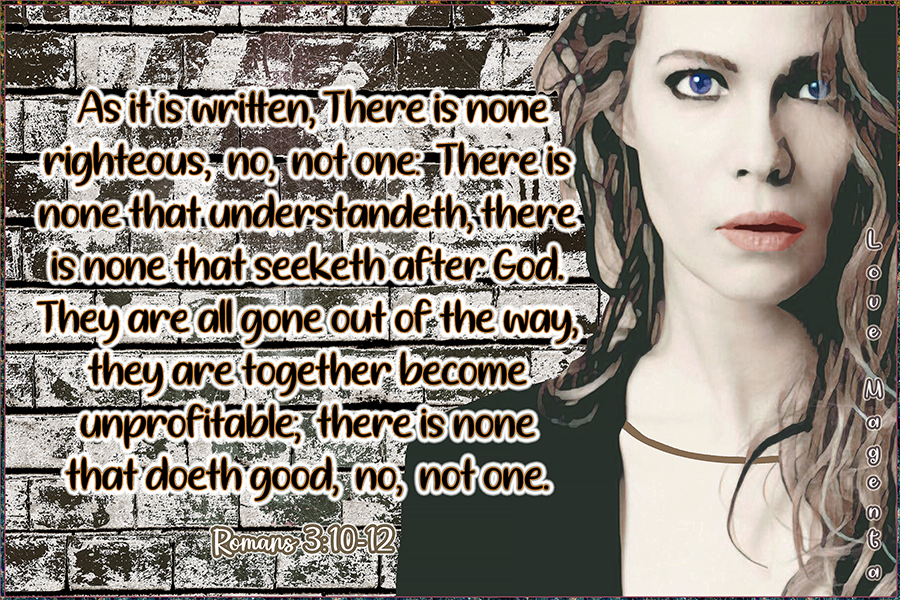There is a common misconception regarding total depravity. Total depravity does not mean that man is as
wicked or sinful as he could be, nor does it mean that man is without a conscience or any sense of right or
wrong. Neither does it mean that man does not or cannot do things that seem to be good when viewed from
a human perspective or measured against a human standard. It does not even mean that man cannot do things
that seem to conform outwardly to the law of God. What the Bible does teach and what total depravity does
recognize is that even the “good” things man does are tainted by sin because they are not done for the glory
of God and out of faith in Him (Romans 14:23; Hebrews 11:6). While man looks upon the outward acts and
judges them to be good, God looks upon not only the outward acts but also the inward motives that lie
behind them, and because they proceed from a heart that is in rebellion against Him and they are not done
for His glory, even these good deeds are like “filthy rags” in His sight. In other words, fallen man’s good deeds
are motivated not by a desire to please God but by our own self-interest and are thus corrupted to the point
where God declares that there is “no one who does good, no not one!” source

Romans 3:10-12
The depraved state of man is not just presented in Calvinism, either, but also in Arminianism, and Molinism.
The Bible teaches that we sin because we are sinners. Of the natural man:
- all our righteous acts are like filthy rags
- there are NONE righteous
- a bad tree cannot produce good fruit
- all are under the control of the evil one
- captive to the will of the devil
- we need to be rescued
- man’s heart is deceitful and desperately wicked
- man is born dead in transgression and sin
- is held captive by a love for sin
- will not seek God
- he loves the darkness
- does not understand the things of God
- suppress the truth of God in unrighteousness
- continues to willfully live in sin
- sinful lifestyle seems right to men
- rejects the gospel of Christ as foolishness
- hostile toward God in their mind
- does not subject itself to the law of God, for it is unable to do so
wicked or sinful as he could be, nor does it mean that man is without a conscience or any sense of right or
wrong. Neither does it mean that man does not or cannot do things that seem to be good when viewed from
a human perspective or measured against a human standard. It does not even mean that man cannot do things
that seem to conform outwardly to the law of God. What the Bible does teach and what total depravity does
recognize is that even the “good” things man does are tainted by sin because they are not done for the glory
of God and out of faith in Him (Romans 14:23; Hebrews 11:6). While man looks upon the outward acts and
judges them to be good, God looks upon not only the outward acts but also the inward motives that lie
behind them, and because they proceed from a heart that is in rebellion against Him and they are not done
for His glory, even these good deeds are like “filthy rags” in His sight. In other words, fallen man’s good deeds
are motivated not by a desire to please God but by our own self-interest and are thus corrupted to the point
where God declares that there is “no one who does good, no not one!” source

Romans 3:10-12
The depraved state of man is not just presented in Calvinism, either, but also in Arminianism, and Molinism.
The Bible teaches that we sin because we are sinners. Of the natural man:
- all our righteous acts are like filthy rags
- there are NONE righteous
- a bad tree cannot produce good fruit
- all are under the control of the evil one
- captive to the will of the devil
- we need to be rescued
- man’s heart is deceitful and desperately wicked
- man is born dead in transgression and sin
- is held captive by a love for sin
- will not seek God
- he loves the darkness
- does not understand the things of God
- suppress the truth of God in unrighteousness
- continues to willfully live in sin
- sinful lifestyle seems right to men
- rejects the gospel of Christ as foolishness
- hostile toward God in their mind
- does not subject itself to the law of God, for it is unable to do so
-
2
-
1
-
1
- Show all


